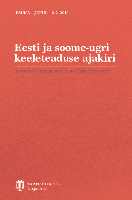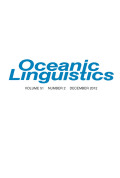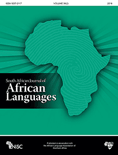
Language Documentation & Conservation
Scope & Guideline
Connecting Communities through Language Conservation.
Introduction
Aims and Scopes
- Language Documentation:
Focus on the systematic collection and analysis of linguistic data from endangered languages, ensuring their preservation for future generations. - Language Revitalization:
Research on methods and practices aimed at revitalizing and maintaining endangered languages, particularly in Indigenous communities. - Technological Integration:
Exploration of new technologies and tools that facilitate language documentation and education, including mobile applications and online resources. - Community Engagement:
Emphasis on collaborative approaches in language documentation, involving speakers and community members in the research process. - Cross-Disciplinary Approaches:
Integration of linguistic, anthropological, sociological, and educational perspectives in understanding and addressing language endangerment. - Data Sharing and Accessibility:
Promoting practices for sharing linguistic data and resources to enhance accessibility for researchers and communities.
Trending and Emerging
- Indigenous Language Revitalization:
There is a notable increase in research centered around Indigenous languages, focusing on community-driven revitalization projects and the role of Indigenous knowledge systems. - Digital Tools and Resources:
Emerging themes include the development and use of digital tools for language documentation, such as mobile apps and online platforms that enhance accessibility and engagement. - Interdisciplinary Collaboration:
An increasing trend toward interdisciplinary approaches that incorporate insights from various fields, including technology, education, and community studies, to support language documentation. - Community-Centric Approaches:
A growing emphasis on participatory research methods that prioritize the voices and experiences of language speakers and community members in documentation efforts. - Youth Engagement in Language Learning:
Research focusing on engaging younger generations in language learning and revitalization efforts is on the rise, reflecting the need to sustain languages through youth involvement.
Declining or Waning
- Phonetic Studies of Major Languages:
Research focusing on phonetics of widely spoken languages has decreased, possibly due to a shift towards documenting lesser-known and endangered languages. - Theoretical Linguistics:
Theoretical frameworks in linguistics have seen reduced emphasis, as practical applications in documentation and revitalization take precedence. - Historical Linguistics:
Less focus on historical linguistic analysis, as current publications prioritize contemporary language use and revitalization efforts over historical perspectives. - General Language Typology:
The broad study of language typology has waned, with a more concentrated focus on specific endangered languages and their unique features.
Similar Journals

Eesti ja Soome-Ugri Keeleteaduse Ajakiri-Journal of Estonian and Finno-Ugric Linguistics
Unveiling New Horizons in Finno-Ugric LinguisticsEesti ja Soome-Ugri Keeleteaduse Ajakiri - Journal of Estonian and Finno-Ugric Linguistics is a premier academic journal published by UNIV TARTU PRESS, dedicated to advancing the field of linguistics with a particular focus on the Estonian and Finno-Ugric languages. Since its inception, the journal has embraced an Open Access publishing model, allowing researchers and enthusiasts to freely explore its groundbreaking studies and findings since 2013. With an Impact Factor that places it in the Q3 quartile of leading journals within the linguistic domain, it serves as a vital platform for the dissemination of new research and theoretical advancements. Ranked 410th out of 1088 journals in the Arts and Humanities category for Language and Linguistics, it reflects a robust commitment to quality scholarship that appeals to academics, professionals, and students alike. Operating from Tartu, Estonia, the journal aims to foster greater understanding and appreciation of the Estonian language within the broader context of Finno-Ugric studies, making it an essential resource for anyone interested in these unique linguistic cultures.

Revue Roumaine de Linguistique-Romanian Review of Linguistics
Cultivating Knowledge in Linguistic Research.Revue Roumaine de Linguistique-Romanian Review of Linguistics, published by EDITURA ACAD ROMANE, is a distinguished journal dedicated to advancing the field of linguistics and promoting scholarly discourse in language-related research. With its ISSN 0035-3957, this journal has established itself as a valuable resource for researchers and practitioners alike, particularly within the linguistics and language categories where it holds a respectable Q3 ranking as of 2023. The journal covers a wide array of topics, focusing on both theoretical and applied linguistics, making it an essential platform for those interested in the latest developments, methodologies, and findings in the field. Although it currently does not operate under an open access model, the Romanian Review of Linguistics remains an impactful publication with its regular convergence of years from 2010 to 2023, providing a comprehensive archive for ongoing research endeavors. With its address located in Bucuresti, Romania, this journal continues to foster a vibrant academic community and supports the ongoing exploration of linguistic phenomena across diverse contexts.

Turkic Languages
Advancing Knowledge of Turkic Language DynamicsTurkic Languages is an esteemed academic journal published by HARRASSOWITZ VERLAG, dedicated to the exploration and analysis of Turkic languages within the broader fields of linguistics and language studies. With an ISSN of 1431-4983, this journal serves as a vital platform for researchers, professionals, and students interested in the intricate structures, dynamics, and cultural contexts of Turkic languages. Although it currently operates without an Open Access option, the journal's commitment to quality research is evident in its placement within the Q4 category of Linguistics and Language for 2023, alongside its Scopus rankings where it stands in the 30th and 26th percentiles for Language and Linguistics across Arts and Humanities and Social Sciences, respectively. The journal's scope encompasses a variety of linguistic phenomena, striving to foster a deeper understanding of Turkic languages and their significance in the global linguistic landscape. With converged years from 2017 to 2022, Turkic Languages continues to uphold its reputation as a crucial resource for advancing scholarship in this specialized field.

OCEANIC LINGUISTICS
Unveiling the Diversity of Oceanic LanguagesOCEANIC LINGUISTICS is a premier academic journal published by UNIV HAWAII PRESS, dedicated to the study of languages spoken in the Pacific region. This esteemed journal, bearing ISSN 0029-8115 and E-ISSN 1527-9421, serves as a vital platform for linguists, researchers, and scholars to disseminate significant findings and insights related to Oceania's rich linguistic diversity. With a commendable impact factor and categorized in the Q2 Quartile for the field of linguistics and language, OCEANIC LINGUISTICS ranks 335th out of 1088 in Arts and Humanities and 395th out of 1167 in Social Sciences, reflecting its relevance and influence in ongoing linguistic discourse. The journal is a subscription-based publication, committed to advancing research and fostering scholarly communication from 2004 to 2024, making it an essential resource for anyone engaged in the study of linguistic phenomena in the Oceania region and beyond.

Stellenbosch Papers in Linguistics Plus-SPiL Plus
Advancing Linguistic Insight and CollaborationStellenbosch Papers in Linguistics Plus (SPiL Plus), published by the Department of General Linguistics at the University of Stellenbosch, is a prominent open-access journal dedicated to the dissemination of research in the field of linguistics. Established in 1980, SPiL Plus provides a collaborative platform for researchers, professionals, and students worldwide, facilitating the sharing of innovative linguistics research from diverse subfields. With an ISSN of 1726-541X and an E-ISSN of 2224-3380, this journal has secured its place in the academic landscape, despite currently holding a Q4 ranking in Linguistics and Language for 2023. It's ranked 481 out of 1088 in the Scopus metrics for Arts and Humanities and stands at the 55th percentile, confirming its relevance and contribution to the linguistics discourse. The journal aims to foster scholarly exchange and address significant linguistic issues, making it an essential resource for anyone passionate about language and its complexities. Readers can access its articles freely, promoting wider accessibility and engagement with linguistic research from South Africa and beyond.

SPRACHWISSENSCHAFT
Unveiling the Nuances of Communication and CultureSPRNACHWISSENSCHAFT is a prominent academic journal dedicated to the field of linguistics and language studies, published by Universitätsverlag C Winter Heidelberg GmbH. With an ISSN of 0344-8169 and an E-ISSN of 2567-6563, this journal serves as a critical platform for researchers and scholars to explore innovative research developments and theoretical frameworks in linguistics. Although the journal's coverage in databases has been discontinued from 2021, it continues to hold significance in the academic community, reflected in its 2023 Q3 ranking in both the Linguistics and Language category, placing it at the 41st percentile in Arts and Humanities. Exploring various dimensions of language and communication, SPRNACHWISSENSCHAFT aims to contribute to ongoing conversations within the discipline, making it an essential resource for academics interested in the evolving landscape of linguistic research.

South African Journal of African Languages
Celebrating the cultural tapestry of African languages.The South African Journal of African Languages, published by Routledge Journals, Taylor & Francis Ltd, is a premier academic resource dedicated to the advancement of research in the fields of linguistics, language, and literary theory. Since its inception in 1996, this journal has been pivotal in fostering scholarly discourse around African languages, contributing significantly to our understanding of cultural and linguistic diversity across the continent. With its impressive categorization in 2023 as Q2 in Linguistics and Language and Q1 in Literature and Literary Theory, the journal attracts high-quality research and innovative perspectives, positioning itself among the leading publications in the relevant academic arenas. Researchers and students alike will find valuable insights within its pages, as it consistently ranks in the top percentiles of Scopus, notably achieving an 81st percentile in Literature and Literary Theory. The journal is committed to enhancing accessibility to research, although it currently does not offer Open Access options. Its scope includes an array of topics related to language policy, linguistic preservation, and literary critique, making it an essential resource for those engaged in the rich tapestry of African linguistics and literature.

Jezikoslovlje
Connecting Researchers to Contemporary Linguistic ChallengesJezikoslovlje, published by the Josip Juraj Strossmayer University, Faculty of Philosophy in Croatia, is an essential publication in the field of Linguistics and Language Studies. Launched in 2008 and extending its contributions to the academic community through 2024, this journal addresses a spectrum of linguistic research, facilitating scholarly dialogue around both theoretical and applied aspects of language. With a current Scopus ranking placing it in the 54th percentile in the Arts and Humanities and the 50th percentile in Social Sciences, Jezikoslovlje serves as a vital resource for researchers and students looking to engage with contemporary linguistic issues. Although it operates under a traditional access model, its indexed presence and rigorous peer-review process ensure that published works maintain a high scholarly standard, inviting contributions that advance understanding in this dynamic discipline. The journal's commitment to fostering knowledge in linguistics makes it a significant platform for academics in Croatia and beyond.

Language and Linguistics
Shaping the Future of Linguistics, One Article at a TimeLanguage and Linguistics is a leading academic journal published by ACAD SINICA, INST LINGUISTICS, based in Taiwan. Established in 2008, this journal has rapidly gained recognition within the field of linguistics, achieving a commendable ranking of Q2 in the 2023 category quartiles and holding positions in the top percentiles of Scopus rankings for both Arts and Humanities and Social Sciences. With an ISSN of 1606-822X and an E-ISSN of 2309-5067, the journal aims to foster the development of linguistics research by providing a platform for the dissemination of innovative and interdisciplinary studies. While it currently operates on a traditional subscription model, its significant contribution to the advancement of linguistic theory and its applications makes it an invaluable resource for researchers, professionals, and students alike. Spanning converged years from 2008 to 2024, Language and Linguistics continues to shape the dialogue in understanding language phenomena and encourages submissions that push the boundaries of current linguistic knowledge.

Voprosy Leksikografii-Russian Journal of Lexicography
Innovative Perspectives on Lexicographic ResearchVoprosy Leksikografii-Russian Journal of Lexicography, published by TOMSK STATE UNIVERSITY, is a premier journal dedicated to advancing the field of lexicography and linguistics. With an ISSN of 2227-4200 and E-ISSN 2311-3758, this journal has established itself as a vital resource for researchers and practitioners in the discipline. As a recognized Q1 journal in Linguistics and Language (2023), it ranks impressively in the Scopus database, placing within the top percentile of both Arts and Humanities and Social Sciences categories. The journal aims to promote scholarly discourse through rigorous research, innovative methodologies, and the exploration of contemporary issues in lexicography. Despite not being open access, it remains pivotal for anyone engaged in linguistic studies, providing essential insights and fostering academic collaboration in the Russian Federation and beyond. For emerging scholars and seasoned experts alike, Voprosy Leksikografii serves as an indispensable platform for disseminating high-quality research in the rapidly evolving landscape of language studies.